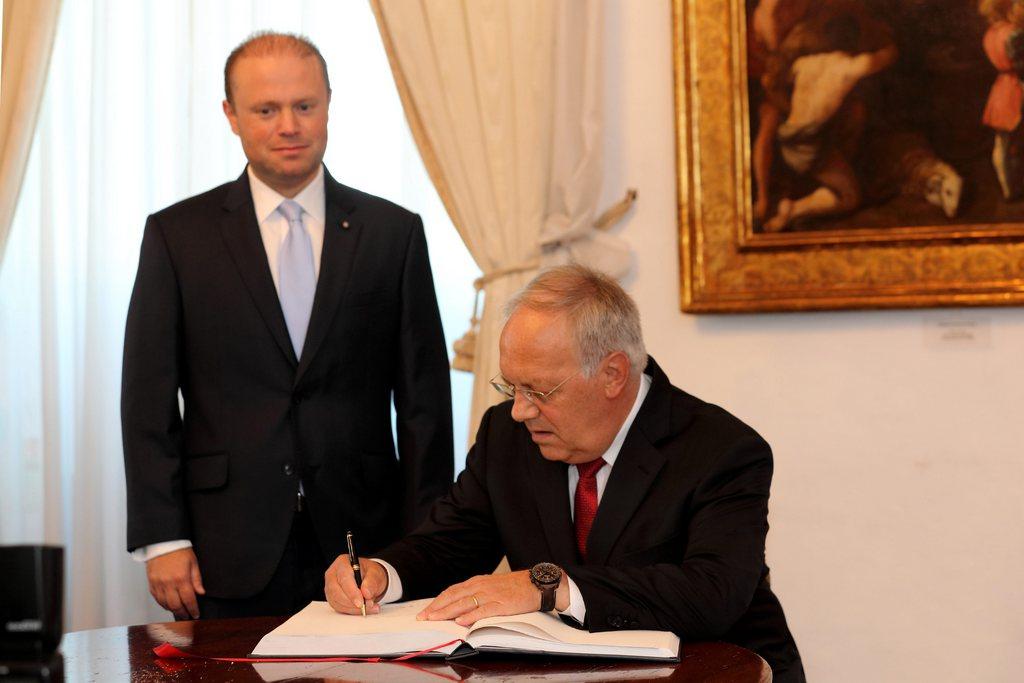
Swiss will look to Malta for help with EU dealings

Swiss President Johann Schneider-Ammann came away from an official visit to Malta confident that Switzerland will have steady help navigating its complicated relations with the European Union.
Schneider-Ammann, the Swiss economics minister who also holds the yearly revolving presidency among the seven-member cabinet of ministers, met with Malta’s leaders on Friday and Saturday.
Malta, the tiny Mediterranean island nation south of Italy, will hold the EU’s rotating presidency during the first half of 2017.
After his meetings with Malta’s President Marie-Louise Coleiro Preca on Friday and with Malta’s Prime Minister Joseph Muscat on Saturday, Schneider-Amman told the Swiss news agency ATS he was satisfied with the visit.
Schneider-Ammann said Malta would serve as a “reliable” ally for the Swiss in their dealings at Brussels. He also confirmed that he would meet with the president of the European Commission, Jean-Claude Juncker, on September 19 in Zurich.
Shadow cast by immigration
Swiss voters in February 2014 narrowly approved a plan supported by the conservative right Swiss People’s Party to re-introduce immigration quotas for EU citizens, putting an additional strain on bilateral relations between Brussels and Bern.
The talks in Malta focused on the 2014 initiative against mass immigration, broader migration policy and the conflicts in Libya and Syria, the economics ministry said in a statementExternal link.
Schneider-Ammann emphasized that the Swiss government wants a solution that is mutually acceptable to the EU.
“Malta clearly expressed its willingness to help find a solution which takes account of both EU and Swiss interests,” the ministry said.
“Malta clearly expressed its willingness to help find a solution which takes account of both EU and Swiss interests,” the ministry said.
Muscat cautioned, however, that the EU’s migration talks with Switzerland will impact Brexit negotiations with Britain.
“The issue is not Switzerland as a country but how this will impact negotiations with the U.K.,” Muscat told reporters in Malta. “Are we redefining what freedom of movement means? This is something that we need to carefully approach.”
“Immigration is the biggest common challenge for the Mediterranean region, and the problem is once again rearing its head,” Muscat said.
Research worries
Schneider-Ammann also emphasised the importance of the EU research programme Horizon 2020 for Swiss scientists.
Switzerland now enjoys partial rather than full participation in the programme, because of the 2014 vote to curb immigration from Europe. In return, Brussels restricted Swiss access to the EU research programme.
Even partial association will end if the Swiss cannot broker a deal with the EU over free movement of people by February 2017. This is looking unlikely as Brussels is tied up with the fallout from Brexit.
“The question of whether or not Switzerland will once again be able to participate in the programme as a fully associated state is likely to be clarified during the Maltese EU presidency,” the ministry said. “The matter is extremely important for Switzerland and also of considerable relevance to its European partners such as Malta.”
For its part, Malta showed what the Swiss ministry described as “considerable interest” in Switzerland’s system of vocational education and training. Switzerland invited Maltese experts to visit and learn more about the specifics of the Swiss model.

In compliance with the JTI standards
More: SWI swissinfo.ch certified by the Journalism Trust Initiative


























You can find an overview of ongoing debates with our journalists here . Please join us!
If you want to start a conversation about a topic raised in this article or want to report factual errors, email us at english@swissinfo.ch.